 BBC News
BBC NewsBorrowing was £17.4bn last month, the second highest October figure since monthly records began in 1993.

Dinesh Dhamija
The world is hotter than ever. Climate-related disasters occur with terrifying regularity.
“Fossil fuel emissions are already causing climate chaos which is devastating lives and livelihoods,” said UN secretary general António Guterres this week, ahead of the COP28 climate change summit in Dubai that starts on 30 November.
And what do the world’s leading economies do? They ‘double down’ on fossil fuel production, cowed by the oil and gas lobbies and by short-term political expedience.
The US, Saudi Arabia and Russia will produce twice as much fossil fuel by 2030 as the UN says is required to restrict global warming to 1.5 degrees above pre-industrial levels.
These nations, and many others, complain that there is no viable alternative to fossil fuels and that cutting them out would lead to ‘energy chaos’.
I don’t agree.
Against this backdrop of superpower intransigence and looming catastrophe, India is quietly building a community of nations dedicated to solving the climate problem rather than pretending it doesn’t exist.
The International Solar Alliance was created in 2015 by India and France to promote investment in and access to solar energy. It now has 116 signatories and 95 full members – Chile joined in early November – and is headquartered in New Delhi.
For all kinds of reasons, I think that the world needs to get behind solar energy. It’s clean, free, reliable and widely available, not only to corporations but to small businesses and individuals, in most regions of the world.
Narendra Modi made solar a central part of India’s energy strategy, developing ambitious schemes as chief minister of Gujarat and then accelerating progress as Prime Minister. India is now the world’s 5th-largest solar energy producer with 62 GW of installed capacity and a force for solar adoption throughout the developing world.
Solar fits Modi’s vision of empowering individuals and communities: you can install solar panels on your roof, whereas you can’t drill for oil or gas. It takes away countries’ reliance upon expensive and politically-fraught energy imports. In the same way, Modi’s digital finance initiatives have given millions of Indian citizens access to life-changing opportunities.
In my own modest way, I’ve tried to contribute to the growth of solar energy, developing a project in Romania which will produce enough electricity to serve a town of 250,000 people. See https://www.romania-insider.com/dinesh-dhamija-solar-park-project-romania-2023 Through this, I’ve seen how solar can transform the energy equation, producing both green electricity and hydrogen, which also has enormous potential to reduce CO2 emissions.
Dinesh Dhamija founded, built and sold online travel agency ebookers, before serving as a Member of the European Parliament. His latest book, The Indian Century, will be published in the Autumn.